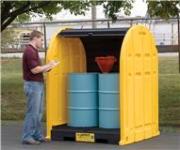The voluntary carbon market shrugged off policy failures and the closure of the Chicago Climate Exchange in 2010 to post a 34 percent surge in volume to a record 131 million tons of carbon dioxide equivalent (MtCO2e) worth at least $424 million, according to a new report.
The U.S. Environmental Protection Agency is ordering Consolidated Tire Recyclers Inc., which operates a tire recycling facility in Mecca, Calif., to remove excess stockpiled tires and improve fire prevention or face fines of up to $7,500 per day.

Supermarkets are among the most energy-intensive buildings around, and refrigeration uses more than half of that energy. That doesn't even include the harm that leaking refrigerants cause to the ozone layer. EPA's GreenChill program works with companies and their refrigeration engineers across the country to help program participants lower their refrigeration emissions of all kinds.
According to a recent report from Pike Research, despite limited production to date, the scale-up potential of algae is substantial compared to other non-food based feedstocks.
According to a survey of more than 100 senior executives in the U.S. and Canadian electric and natural gas industries, the five most critical challenges facing the North American energy industry, in order of importance, are: environmental regulation, aging infrastructure, non-environmental regulation, an aging industry workforce, and the need for new pricing mechanisms.
Nine partners from seven countries have joined in a project to show that ethanol, biodiesel and bioproducts can be produced from algae on a large scale.
A University of Sheffield professor has found a way of locking up iodine radioisotopes in a durable, solid material suitable for ultimate disposal, such as lead iodovanadinite(Pb5(VO4)3I).
The once degraded forests in the Curacautin Valley in Chile have now recovered sufficiently, after hard work over the last decades, to be able to help provide a sustainable living to the people in the area, based on fair trade and responsible forest management principles.
GE unveiled its latest wind turbine technology, the 1.6-100, at the American Wind Energy Association’s (AWEA) Windpower 2011 Conference & Exhibition. The company has already secured nearly 630 megawatts of commitments for the evolutionary 1.6-100, which has been designed for increased performance in areas with lower wind resources
Vermont Gov. Peter Shumlin signed into law a bill that requires manufacturers of mercury-containing lamps to establish and finance a recycling program for spent bulbs from residents and small businesses.
An air quality study near Marcellus Shale natural gas operations in Bradford, Lycoming, Sullivan and Tioga counties in Pennsylvania found no emission levels that would pose a public health concern, according to a report released by the state’s Department of Environmental Protection.
energyOrbit, a cloud-computing company in the Demand Side Management sector, announced the successful Implementation and roll out of energyOrbit at Santee Cooper, one of the country’s largest public utilities.

Radionuclides in seawater have been reported from the Fukushima plant's discharge canals, from coastal waters five to 10 kilometers south of the plant, and from 30 kilometers offshore, that are at least an order of magnitude higher than the highest levels in 1986 in the Baltic and Black Seas, the two ocean water bodies closest to Chernobyl.
Advocates of the biofuels industry sent Congress a letter urging lawmakers "to stand firm in the face of calls to waive or repeal the groundbreaking biofuels provisions included in the Energy Independence and Security Act of 2007 (EISA), including the Renewable Fuels Standard (RFS)."
Chesapeake Energy agreed to pay the penalty for using faulty well casings that allowed natural gas to seep into the water supply and for improper handling of a wet gas that resulted in a fire.
The project is part of the Russian government’s development plan for St. Petersburg and also supports the country’s overall strategy to expand and continue to modernize its energy infrastructure.
The agreement resolves the company’s National Pollution Discharge Elimination System permit violations and unpermitted discharges at the mines and mills that occurred from 2008 to 2010.
Region 7’s latest round of CAFO enforcement activity, aimed at encouraging producers’ compliance with the Clean Water Act and the National Pollutant Discharge Elimination System (NPDES) permitting program, involves seven beef feedlots, including four in Iowa, two in Kansas and one in Nebraska.
CWCO selected the devices and pumps based on its experience with them in two previous SWRO projects.

Ignoring EPA regulations can be costly -- and not just in terms of fines.